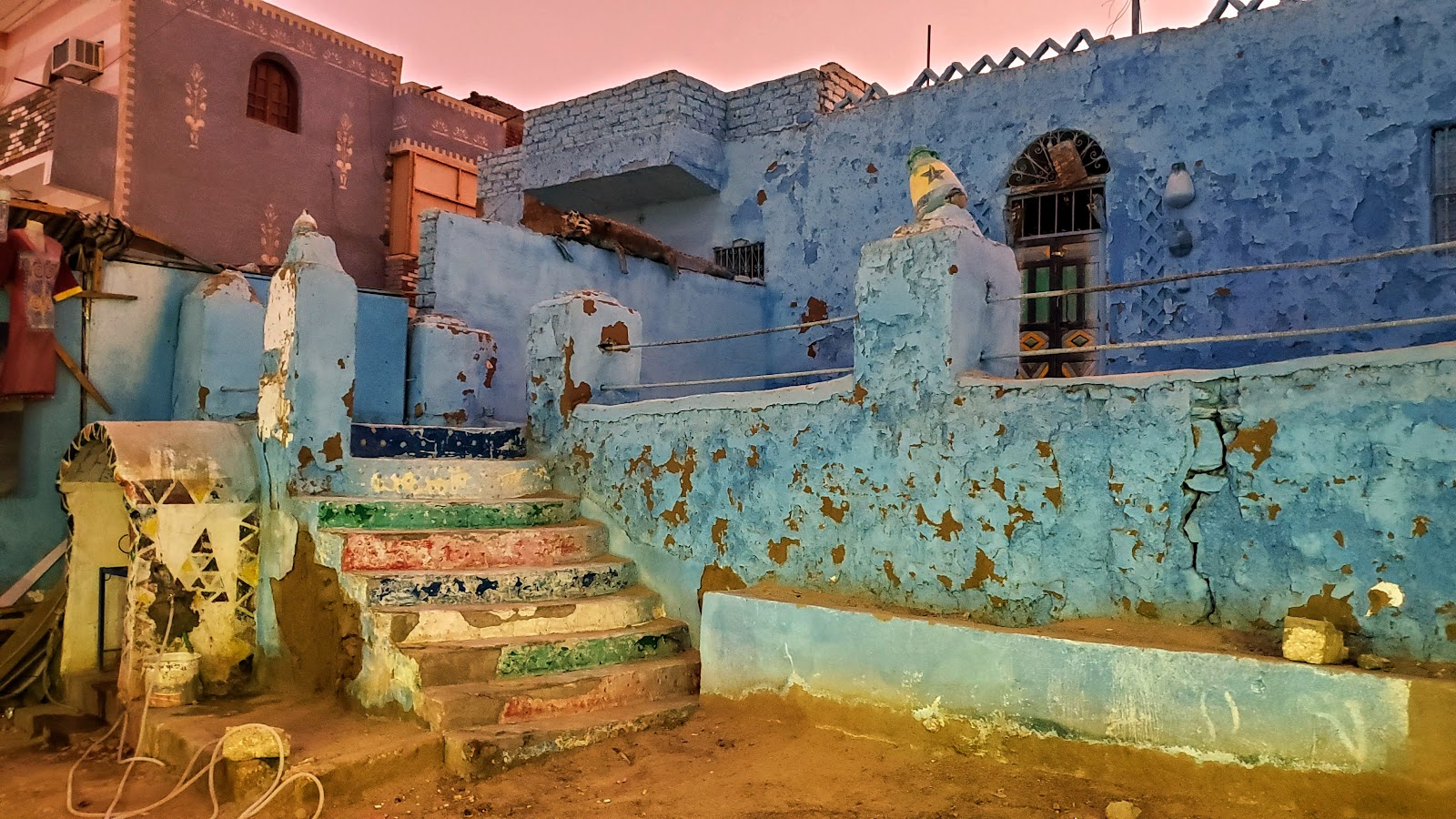Tea and No Elephants (Elephantine Island)
On the tarmac in Aswan, I’m greeted with a temperature of 44 degrees. Celsius.
That's 111 degrees in American freedom units.
It’s hot - a fry an egg on the cement kind of hot. Immediately Aswan has a
much more mellow vibe than Cairo. It’s far smaller, with a different cultural
and ethnic composition. A taxi takes me to the city pier, where my host
Muhammad meets me with a cold cup of hibiscus juice. We cross the Nile river by motorboat.
A short boat ride away from the city is Elephantine Island, a tiny Nubian
village. Named not because there are elephants, but because the island is
shaped like an elephant. Blissfully devoid of urban planning and cars, with a
tranquil Hakuna Matata vibe in the air. I spent my days getting pleasantly
lost in little alleys, making friends with the stray cats, and drinking tea
with strangers. I found myself charmed by the island. There's a tranquility
and hospitality in the Nubian people that is next level. Anyone will say
hello, welcome, do you need directions? They did find it perplexing to see me
wandering about, ambling along without an agenda in the midday dry heat. Maybe
that's why I got asked if I was lost so many times.
My host Muhammad was one of the most genuinely kind people I've met. He had a
passion for plants - all sorts of exotic herbs and flowers dotted the place,
with more on his little island just across the strait. My tea was never
without a mint leaf freshly picked. He built the house for his family but his
wife didn't want to move to the island, and so he turned it into a lodge.
During the summer he closes it down so his kids can stay with him - a girl of
18 and and a boy of 15. The girl is about to head off to college in Cairo for
interior design. I learned all about local weddings, the mango season, his
grand plan to go back to farming in Sudan, and Egyptian politics. Nubians are
an African people, the DNA closer tied to the people in Sudan and Kenya, not
the Arabs - and were once Christian. Though they pray to Allah now, they still
love their drink and dance. He told me to come back to Aswan, but not in
February - too many Egyptians traveling. And definitely not in the summer -
it’s even hotter and many places close down for the season. March is best. He
left me with a new perspective on what it means to have a sunny disposition
along with a fistful of hibiscus seeds. I promised if I can make these grow in
my garden I will send him a picture.
During my ambles in little alleyways, I ran into a little museum, where the
owner, another Mohammed, showed me his extensive collection of antiques.
There's basically three first names for men in Egypt, Mohammed being the most
popular. He showed me cameras from the early 1900s, ancient China, crocodile
teeth, antique statues and trinkets. He wanted to make a deal - a tribal mask
that I wanted in exchange for getting him a secondhand cellphone from the US.
Prices are high and quality is not good, so the locals get creative with how
to get what they need. With a pang I realize how much I take for granted:
eBay, Amazon, and all the top notch electronics and goods available at the
press of a button and delivered to my door, along with the power of the dollar
that makes most currency conversions pleasantly surprising. While I have mixed
feelings about life in America, I can't deny that half the places I find
charming may partly be because I, unlike the locals, always have the option to
leave.
--
A highlight of my days there was a felucca boat ride. An ambling, peaceful
sail around the island on a traditional Egyptian sailboat. No engine roar, no
music, just the water and a gentle breeze. A father, who was teaching his son
how to handle the sails, took me around for 2 hours for a mere 300 Egyptian
pounds, or $16.
And because this is Egypt, there is always a temple or a ruin to visit. On the
island, the remains of the ancient town and temples take up a portion of the
island.
To my surprise, one of the guards dug up a tiny mummified foot out of the
corner of one of the ruins. Government wages not withstanding, this was the guard's strategy for getting tips. It was successful.


















































Comments